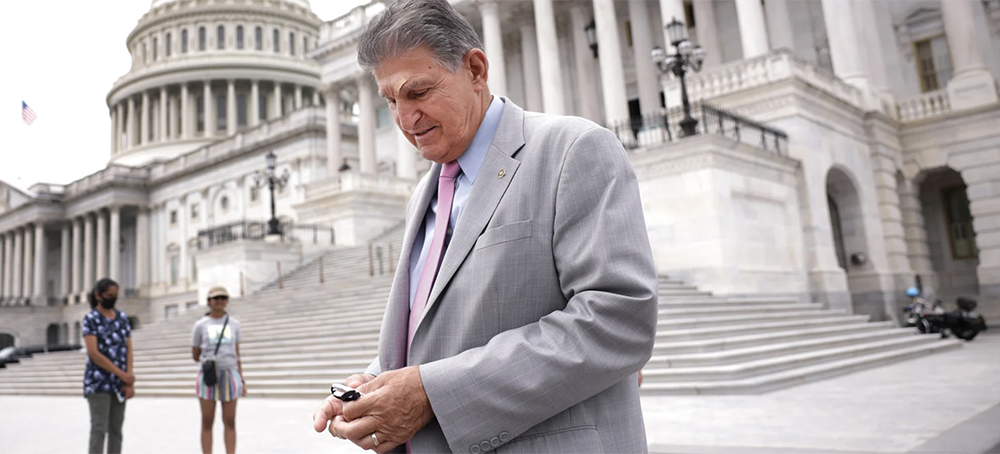Live on the homepage now!
Reader Supported News
His op-ed about the national debt is not really about the national debt.
Manchin had already said that he had “serious concerns” about a $3.5 trillion bill back in mid-August. But in a Wall Street Journal op-ed published Thursday, and in related remarks to the West Virginia Chamber of Commerce, Manchin called for a “strategic pause” on consideration of the proposal.
“Instead of rushing to spend trillions on new government programs and additional stimulus funding, Congress should hit a strategic pause on the budget-reconciliation legislation,” Manchin wrote in the Journal. “A pause is warranted because it will provide more clarity on the trajectory of the pandemic, and it will allow us to determine whether inflation is transitory or not.”
Democrats understand that Manchin, the most conservative Democrat in the Senate, isn’t keen on passing a $3.5 trillion, party-line bill. What drives them up the wall, though, are the arguments he’s using against it.
Nowhere in his many complaints about the national debt, and how adding an excess $3.5 trillion in debt now could accelerate inflation, is an acknowledgement of the relevant fact that Democrats are not writing a bill that adds $3.5 trillion to the debt. The budget blueprint that Democrats have already passed would only allow them to add about half of that to the debt, if they were so inclined—the rest would be offset with tax increases and other savings found by the Senate Finance Committee. But Democrats, specifically to satisfy Joe Manchin, have also said many times that they would pay for the entire bill anyway. Some of the accounting will be gimmickry, sure, but Manchin didn’t complain about the accounting gimmickry in the bipartisan infrastructure bill, which he adored.
Maybe these are famous last words, but I don’t see Manchin ultimately tanking a reconciliation bill over concerns of this nature. Something is likely to pass, even if the final product is a skeleton of Bernie Sanders’ transformative vision. Instead, his op-ed is the latest step in a coordinated effort from centrist Democrats in both the House and Senate, and their outside peers, to secure leverage over the endgame.
Manchin and those aligned with him needed to do something to regain some influence. The original legislative strategy that House Speaker Nancy Pelosi put together was that the House would not pass the Senate-approved bipartisan infrastructure bill—which centrists desperately want to see signed int o law—until the Senate had also sent over an adequate reconciliation bill. By holding the bipartisan deal hostage, progressives, in theory, could compel centrists’ participation in the reconciliation bill.
Centrists, then, came up with a plan to free the hostage. In August, nine House moderates, led by New Jersey Rep. Josh Gottheimer, threatened not to pass the budget blueprint that would set up the reconciliation process until they got a vote on the bipartisan deal. After some delayed votes and torrid late-night negotiating sessions, the Gott Gang and House Democratic leaders struck a deal: The House would vote on the bipartisan infrastructure bill no later than Sept. 27. The House moderates were egged on in these negotiations by Manchin and Arizona Sen. Kyrsten Sinema, as well as by the well-financed centrist group No Labels.
Pelosi said afterwards that she had always intended to hold a vote on the bipartisan infrastructure bill by the end of September, as that’s when the existing highway bill expired. What the moderates secured, then, was a public acknowledgement from Pelosi that her open-ended commitment to hold the Senate bill hostage was untenable.
And so it does not surprise me that, shortly after House moderates put an expiration date (Sept. 27) on whatever leverage progressives had, Joe Manchin would write an op-ed calling for a “strategic pause” to slow the reconciliation process down. There is indeed a considerable amount of strategy in the pause Manchin proposes, but it has little to do with the misleading debt and inflation arguments he makes in his piece. Manchin, and fellow moderates, want to see the bipartisan infrastructure deal passed out of the House so that they have the ability to walk from the reconciliation bill if they want to. That ability would give them the absolute upper hand in negotiations over it.
Progressives do still have another card to play, and they’re talking a big game about playing it: They could vote down the bipartisan infrastructure bill when it comes to the House floor until there is, at least, some shared understanding about the broad contours of the reconciliation bill. But they may not have the numbers, depending on the number of House Republicans who will vote for the bipartisan infrastructure bill. They would also find themselves in a difficult spot, as time went on, holding out against a top piece of Biden-supported legislation while surface transportation authorization has lapsed.
Again, odds are this all gets worked out some way, as both pieces of the Biden agenda have attained a certain too-big-to-fail status. If it all goes south, though, there will have been a bigger problem at play from which all the threats and hostage-taking were merely symptoms: Democrats on opposing wings of the party do not trust each other to hold up their ends of the bargain. If they did, there would not be so much angst and strategic plotting about something as basic as the sequencing of votes.
Follow us on facebook and twitter!
PO Box 2043 / Citrus Heights, CA 95611



No comments:
Post a Comment